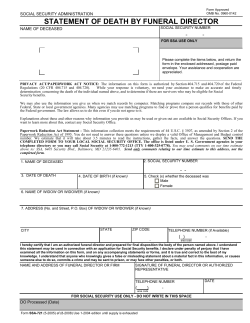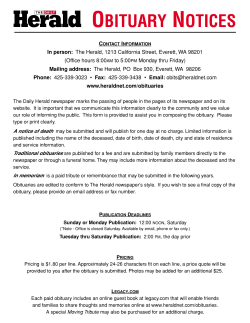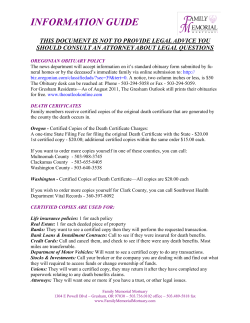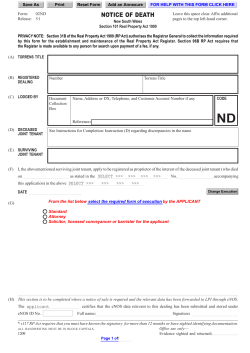
AFTER A DEATH OCCURS – A Checklist
AFTER A DEATH OCCURS – A Checklist Here is a checklist of important things to do when someone close to you dies. This can be a very overwhelming and emotional time. It is a good idea to read this checklist before a death occurs, in order to plan and understand the practical steps of this difficult process. Legal Information & Referral: 206-621-7691 Toll-Free: 1-866-259-7720 TTY: 206-521-4317 Web: www.legalvoice.org It is also helpful to keep all your important information in one location and tell someone where you keep it. The words “deceased” and “decedent” mean “the person who died.” “Estate” is the property belonging to the person who died. 1. Immediate Steps Call 911 right away if there is an unexpected death in your home. The medical team will help you figure out the next steps. If the deceased was receiving hospice care, call the hospice. Call your doctor or your hospice before an expected death, to discuss what to do when or if a death happens in your home. Most deaths occur in hospitals and other places such as nursing homes. Talk to the staff about their process. Contact close family and/or friends of the deceased, the deceased’s doctor (if a hospice is not involved), and the deceased’s lawyer, if any. Look for any written instructions (sometimes called a “Letter of Instruction” or “Final Instructions”) for funeral or memorial service, and burial arrangements. If not found, ask close friends, the deceased's doctor or lawyer if they know where these instructions are. Ask if there are any pre-paid services. Look for records of the deceased person’s desire to donate organs or tissue (usually noted on a Washington State driver’s license with a red heart symbol or the word “Donor,” or mentioned in the deceased’s “Final Instructions”). Give this information to the deceased’s doctor or hospice immediately (or before the death, if possible). Arrange for funeral or memorial services, and burial or cremation. Washington State usually requires embalming if the body will be held or transported more than 24 hours after death. See the section called For More Information at the end of this document. Copyright Legal Voice, Seattle, WA 2010 1 Death Certificates: You can order certified copies of the death certificate from the funeral director or your hospice. Often you can get them from the local Department of Health office in the county where the death occurred (see Resources at the end of this document). Generally, you will need one certified copy of the death certificate for each major asset, such as cars, land, or bank accounts, that you will need to transfer ownership of. You may also need a certified copy for life insurance policies, veteran’s survivor benefits, annuities, etc. Certified copies are expensive (approximately $20- $32 each, plus fees). Ask if a noncertified photocopy is allowed, or if the company would return the original certified copy to you so you could use it later. 2. Next Steps - Locate Important Papers Find the deceased’s important papers and documents as soon as possible. If necessary, ask close family, friends, the deceased's doctor or lawyer if they know where these important papers can be found, and the location of a Bank Safe Deposit Box, if any. In Washington State safe deposit boxes of the deceased are not sealed. Anyone who has legal access has the right to open the safe box. (See the For More Information section at the end of this document to learn what to do if there is no one available with access to the safe deposit box.) The Will – First, find out if the deceased left a will and/or a trust. If there is a Will, notify the Personal Representative named in the will (and the Trustee, if named in a trust) right away. The Personal Representative is responsible for taking care of the deceased’s estate and for following the terms of the will, while the Trustee is responsible for managing the trust. Sometimes the Personal Representative is called the “Executor” or “Executrix”. If you are listed as the Personal Representative and/or Trustee, see the section called For More Information at the end of this document In Washington, a valid and signed Will must be filed with the Superior Court, usually in the deceased’s county of residence, within 30 days of the death. This is an extremely important step to complete if there is a will. See the section For More Information to find instructions on how to do this. If there is no Will, see the section For More Information at the end of this document. Other Items – Locate other important papers and documents as soon as possible. If there is a Will and/or Trust, give all of the important papers to the Personal Representative and/or Trustee as soon as possible. If there is no Will, see the section For More Information for further instructions about what to do with these important papers. Copyright Legal Voice, Seattle, WA 2010 2 Here is a list of some things to look for: Insurance Policies o Life Insurance (including premium payment records) o Accidental Life Insurance o Veteran’s Insurance o Employers or Pension Insurance o Funeral Insurance (or other death-related benefit plans) o Mortgage and/or Credit Insurance o Credit Card Insurance (for balances) o Health Insurance (including Medicare or Medicaid, “Medigap” insurance, private health insurance, dental, and Long Term Care insurance) o Property Insurance (homeowners/renters insurance, car insurance, etc.) o Worker’s Compensation Insurance (and payment records) Financial Accounts Including most recent statements for all accounts and the list of Beneficiaries, if any. o Bank Accounts - Checking, Savings, CD’s, etc. o Investment/Brokerage accounts, IRA’s, 401-K’s, etc. o Stocks and bonds o Annuities o Credit and Debit Card accounts o List of safe deposit boxes, where to find keys, and names of authorized users Other Financial Records o Survivor Annuity Benefit papers o Employer/Retirement Benefit (Pension) plans, pension/profit-sharing plans, etc. o Veteran Benefit records o Disability Payment Documents (State, Veteran’s, etc.) o Income Tax Returns (from the current year) o Gift Tax returns (for all years) o Property Tax records and statements o Business Interests held, financial statements and agreements, contracts, etc. o Loan Papers o Other - Investment records, etc. Deeds and Titles o Property Deeds (including any recent appraisals) o Mortgage Documents (and promissory/loan notes) o Vehicle Titles and Registrations (car, boat, RV, etc.) o Membership Certificates Copyright Legal Voice, Seattle, WA 2010 3 Legal Papers o Court Documents for divorce (including any property settlement agreements, name changes, prenuptial agreements, adoptions, etc.) o Military Service papers, including Discharge records o Will and/or Trusts o Deceased’s Final Instructions o Pre-paid Funeral Contracts o Organ/Tissue donation record o Social Security Card (or number) o Birth Certificates (of all family members) o Marriage License o Community Property Agreements o Domestic Partnership Registration o Driver’s License o Passport, Citizenship, Immigration and/or Alien Registration papers Personal Information o Names and contact information of closest family and friends o Names and contact information of all lawyers, accountants, doctors, etc. o Family Tree, if available (especially if there is no Will). 3. Practical Steps and Information Make a list of regular bills to have as a reminder - be sure to note if any are on automatic payment plans, or note when payments are due. Give all unpaid bills to the Personal Representative (if any) to be paid. Some examples of bills to locate: o Utility Bills (electric, heating, telephone, cell phones, water/sewer/garbage, etc.) o Long Term Debts (home mortgages, Bank Line of Credit, car loans, etc.) o Rental fees (home, apartment, assisted living, or nursing home, etc.) o Credit Card and Debit Card bills o Insurance bills (health, Long Term Care, home, car, life insurance, etc.) o Property Tax bills (if paid separately and not included in home mortgage) Access to Bank Accounts - If you are a co-signer or have a joint account with the deceased, you should be able to use some of the money in the account to pay the regular bills of the deceased. Keep detailed records of all the bills you pay and any withdrawals of cash from the account. Power of Attorney - If you were the holder of a Power of Attorney (sometimes called an “attorney-in-fact” or the “agent”) for the deceased, your authority to act under the Power of Attorney ends at the time of death. Copyright Legal Voice, Seattle, WA 2010 4 Check and take care of the deceased’s home, property, and pets, if necessary. Put valuables (cash, jewelry, collectable items) in a safe place. Be sure the house is locked, if no one is home. Contact the Post Office with forwarding information, if necessary. Stop all deliveries of unneeded newspapers, home care services (such as meal delivery or nursing services), and cancel any appointments for doctors, dentists, etc. Cancel services that are no longer needed (such as cell phones, internet, or cable TV). Do not cancel utilities, as they may still be needed. 4. Notification of Death (and Check for Benefits) Once you have notified all close family and friends, the deceased’s doctor and lawyer (if any), and the Personal Representative and/or Trustee (if one is named in a Will and/or Trust), you should give notice of the death as soon as possible to the agencies and companies listed below. At the same time, you should check and apply for any Death Benefits or Survivor Benefits from these organizations. This is money paid after a death to the person or persons named as “beneficiary”. A “beneficiary” is a person who receives money or property, such as from the deceased’s life insurance policy, retirement pension, or annuity. It can take two or more months for benefits to arrive, so be sure to start soon. Call these offices to find out their requirements, such as sending a certified copy of the death certificate. Make a note with the date you made your calls, and write down what is required as a reminder of what you need to do. See the Resources section below for contact information. Here is a list of some agencies and companies to notify: Social Security - You must notify the Social Security Administration of the death, and apply for any possible Social Security death benefit and survivor benefits. You will need the deceased’s Social Security number and date of birth. The Social Security office automatically notifies Medicare of the death. For information on Survivor’s benefits see the For More Information section at the end of this document. Date & Notes: _________________________________________________________________ ______________________________________________________________________________ ______________________________________________________________________________ Copyright Legal Voice, Seattle, WA 2010 5 Insurance Companies - Contact all the insurance companies on the list you made from the deceased’s records. This includes policies which might pay death benefits to the beneficiary or beneficiaries named in the policy (such as Life Insurance or annuities). Contact policies which might pay for account balances (such as for mortgages, credit cards or other loans). Date & Notes: _________________________________________________________________ ______________________________________________________________________________ ______________________________________________________________________________ All other insurance companies (such as property insurance, health and dental insurance, Long Term Care insurance, etc.) must be notified of the death so that the policies can be either changed or cancelled. Ask for any unused premium to be returned to you. Date & Notes: _________________________________________________________________ ______________________________________________________________________________ ______________________________________________________________________________ Employee Pensions and Benefits - If you are the beneficiary, contact the deceased’s employer and ask about any possible death benefits, retirement annuity or pension plans, and life and health insurance coverage. Unions and other professional organizations may provide benefits also. Note: Sometimes you must return the deceased’s final monthly pension payment to the pension company before they send a new, adjusted payment. Date & Notes: _________________________________________________________________ ______________________________________________________________________________ ______________________________________________________________________________ Veteran’s Administration - If the deceased was a Veteran, notify the VA to ask about possible death benefits and survivor’s benefits. See the For More Information, section of this document to find information about Veterans Benefits. Date & Notes: _________________________________________________________________ ______________________________________________________________________________ ______________________________________________________________________________ Banks, Financial Institutions, and Credit Card Companies - If you were a co-signer or had a joint account with the deceased, you must notify the Bank or other Financial Institutions of the death. For joint accounts “with the right of survivorship” the survivor owns all of the money in the account, but you still must notify the bank of the death. Date & Notes: _________________________________________________________________ ______________________________________________________________________________ ______________________________________________________________________________ Office of Financial Recovery (OFR) - If you are responsible for the deceased's estate, you must send notification of the death to Washington State's Office of Financial Recovery. This office is part of DSHS/Medicaid. See the memo "Estate Recovery for Medical Services Paid for by the State" listed in the For More Information section at the end of this document. Date & Notes: _________________________________________________________________ ______________________________________________________________________________ ______________________________________________________________________________ Copyright Legal Voice, Seattle, WA 2010 6 Washington State Department of Revenue (D.O.R.) - The DOR needs to be notified of the death if the deceased had an active Sole Proprietor business. Date & Notes: _________________________________________________________________ ______________________________________________________________________________ ______________________________________________________________________________ Washington State Department of Labor & Industries - Crime Victim’s Compensation Program - Contact this agency for help and possible benefits if the death was a result of a criminal act. Date & Notes: _________________________________________________________________ ______________________________________________________________________________ ______________________________________________________________________________ Washington State Department of Labor & Industries - Notify this agency for possible Worker’s Compensation benefits if a job-related injury or illness caused the death. Date & Notes: _________________________________________________________________ ______________________________________________________________________________ ______________________________________________________________________________ Credit Bureaus - It is recommended to notify the three major Credit Bureaus of the death, to help avoid possible identity theft. These are Equifax, Experian and TransUnion. Date & Notes: _________________________________________________________________ ______________________________________________________________________________ ______________________________________________________________________________ Washington State Department of Licensing (D.O.L.) - It is recommended to send a copy of the death certificate to the DOL, to help avoid possible identity theft. Date & Notes: _________________________________________________________________ ______________________________________________________________________________ ______________________________________________________________________________ Landlord - Notify the deceased’s landlord as soon as possible, to discuss lease or rental agreements, and moving out dates if necessary. Ask about the possible return of the deceased’s security deposit. Date & Notes: _________________________________________________________________ ______________________________________________________________________________ ______________________________________________________________________________ 5. Final Steps See For More Information to find information about Funerals and the Estate Administration process. Copyright Legal Voice, Seattle, WA 2010 7 Resources: Washington State Department of Health Center for Health Statistics 360-236-4300 (Olympia, WA) www.doh.wa.gov/EHSPHL/CHS/cert.htm For death certificates - This office will give you the contact information for the local Department of Health in the county where the death occurred. If the death occurred three or more months ago and the death certificate is no longer available at the local Department of Health office, you can apply directly to this office. Vital Statistics - Public Health Seattle & King County 206-296-4768 (Seattle, WA) www.metrokc.gov/health/vital_st For death certificates, if the death occurred in King County. Social Security Administration 1-800-772-1213 www.socialsecurity.gov For notification of death and to check for benefits. Veteran’s Administration 1-800-827-1000 www.va.gov For notification of death and to check for benefits. Office of Financial Recovery PO Box 9501, Olympia, WA 98507-9501 1-800-562-6114 For legally required notification of a death in the state of Washington. Send notice, including the deceased’s Social Security number and date of death, by certified mail with return receipt requested. See "Estate Recovery for Medical Services Paid for by the State," listed below. Washington State Department of Revenue (DOR) 1-800-647-7706 www.dor.wa.gov P.O. Box 47488, Olympia, WA. 98504 For notification of the death if the deceased had an active Sole Proprietor business. Washington State Department of Labor & Industries 1-800-LISTENS (1-800-547-8367) Claims; 1-800-4BE-SAFE (1-800-321-6742) Reporting workplace fatalities www.lni.wa.gov Contact immediately if death was due to work-related illness or injury. Copyright Legal Voice, Seattle, WA 2010 8 Washington State Department of Labor & Industries - Crime Victim’s Compensation Program 1-800-762-3716 Contact for help if death was due to a crime. www.lni.wa.gov/ClaimsIns/CrimeVictims/Homicide Washington State Department of Licensing (DOL) Record Update PO Box 9030 Olympia, WA. 98507-9030 Send photocopy of the death certificate, to help avoid possible identity theft. For More Information: Legal Voice will be publishing a Handbook for Washington Seniors: Legal Rights and Resources. See our website www.LegalVoice.org or call our Legal Information and Referral Line to find out if the publication is available. Legal Voice Legal Information and Referral Line (206) 621-7691 1-866-259-7720 Washington Estate Administration and Probate information provided by attorney Richard Wills: www.washington-wills.com/ www.wa-probate.com/Instructions/index.html For information on Safety Deposit Boxes: www.wa-probate.com/Instructions/Opening/Access-Safety-Box.htm If the person did not leave a will: www.wa-probate.com/Instructions/Opening/Opening.htm#Filing Social Security Survivors Benefits: www.ssa.gov/pgm/links_survivor.htm Death Benefits and Survivor Benefits for Veterans: www.dva.wa.gov/familiy_benefits.html “Dealing with Death - Once a Death Occurs” Information on funerals, death benefits, financial concerns, property and taxes. Washington State Attorney General’s website: www.atg.wa.gov/DealingWithDeath/default.aspx "Estate Recovery for Medical Services Paid for by the State" www.washingtonlawhelp.org In the yellow search box at the top of the web page, type the memo title "Estate Recovery for Medical Services Paid for by the State". Click on that title in the search results. Copyright Legal Voice, Seattle, WA 2010 9 “Dealing With Death of a Loved One” Estate Planning Council of Seattle www.epcseattle.org “What to Do When a Death Occurs” Senior Rights Assistance 206-448-5720 www.seniorservices.org In the search box at the top of the page, type “what to do when death occurs”. Click on that title in the search results. “Grief and Loss” AARP- Final Details, Finances, Funerals, etc. www.aarp.org/families/grief_loss Janne Endreo, January 18, 2010 Copyright Legal Voice, Seattle, WA 2010 10
© Copyright 2025





















